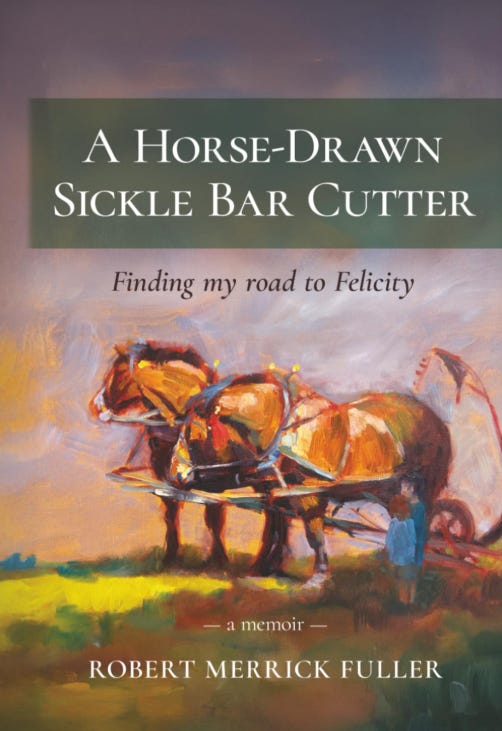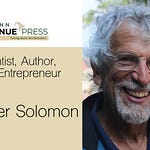Welcome back to Munn Avenue Muse, the corner where storytelling meets memory, and where writing becomes a tool for truth, legacy, and connection.
In our latest podcast episode, Charlie Levin spoke with Robert Merrick Fuller, author of the quietly powerful memoir A Horsedrawn Sicklebar Cutter. What started as a conversation about his book unfolded into something much larger, a moving reflection on how personal storytelling preserves the past, strengthens our legacy, and honors the rhythms of life that still echo through us.
Whether you’re writing a memoir, capturing family history, or simply exploring what it means to write honestly, this episode is a deep well of inspiration. Below are the key takeaways for every writer interested in memoir writing, sensory storytelling, and legacy preservation.
1. Start With the Senses: Why Memory Needs Sound
If you’re looking for powerful memoir writing tips, start here: ground your story in a sensory anchor. For Robert, it was the sound of a classic sicklebar cutter pulled by draft horses, a rhythmic, oscillating pulse unlike the modern, steady hum of a tractor.
This sound, woven into his earliest memories in Lowell, Massachusetts, became the heartbeat of his book. It’s not just nostalgia; it’s resonance. As shared during the conversation, that kind of oscillation, like breath, like a heartbeat, stays with us because it lives in the body.
Memoir tip: Find that one resonant detail that evokes time and place viscerally. Whether it’s a smell, a texture, or a sound, let it lead your reader into the world you’re remembering.
2. Memoir as Personal Truth and Historical Record
Robert’s story is deeply personal, but it also spans history from Mayflower ancestry to the post-war changes in American farming. He grew up in a 150-year-old farmhouse as the sixth generation of Fullers. And yet, he admitted: “I wish I had asked my grandfather more.”
This tension between what we know and what we’ll never know is part of why writing a memoir matters. Memoir isn’t just personal reflection; it’s a record for those who come after us.
But let’s be clear: it’s not history alone that gives memoir power. It’s honesty. Robert spent three years deciding what to include, what to hold back, and how to tell the truth about his life, including his father’s struggles and his own adult experiences.
He leaned on Barbara Kingsolver’s advice:
“Close the door and write as if no one were looking over your shoulder... Figure out what you want to say. That’s the one and only thing you have to offer.”
And that’s where legacy writing begins, not in telling everything, but in telling what is true to you.
3. Read to Write: Finding Your Own Road to Felicity
Robert offered one of the simplest but most powerful pieces of advice for memoirists: read widely.
He was particularly moved by How to Say Babylon by Sophia Sinclair, a story vastly different from his own, yet equally rooted in determination and voice. Inspired by Sinclair’s poetic honesty, Robert included five original poems in his memoir.
The takeaway? You don’t need to read stories like your own, just stories that ring true. As Robert says, every life has its own road to felicity (his word for bliss, purpose, contentment). Writing helps us trace that road, even if we’re still walking it.
4. Writing With Time in Mind: Memoir as a Legacy Act
Toward the end of our conversation, Robert shared something that many writers hold silently: he’s living with Stage 4 cancer. And yet, his outlook is anything but grim.
He sees his memoir as part of a larger legacy, an act of documentation, intention, and care. He’s planning his own obituary, building his own coffin, choosing green burial over gravestone, and even leaving behind memorial benches. Why? “So I don’t leave it all to somebody else.”
He and his wife are also paying forward, supporting students in Ghana through the Wells Mountain Initiative. Writing, legacy, service, for Robert, they’re all part of the same story.
And he’s not done yet. He’s already envisioning three more books: one about his 40 years in the culinary world, one on his motorcycle life, and one chronicling his decades of travel with his wife.
Final Thoughts: Write the Story Only You Can Tell
Robert Merrick Fuller’s A Horsedrawn Sicklebar Cutter is more than a memoir; it’s a reminder that our memories matter, our voices carry, and our legacies are still being written.
If you’re an author working on your own memoir, or a reader seeking stories rooted in honesty and heart, I encourage you to listen to the full episode. You’ll find insights not just into how to write but why we write at all.
📘 Where to Find the Book
Available now at:
Bookshop.org (supports independent bookstores)
If you are ready to share your own story, whether it is fiction, nonfiction, or a blend of both, Munn Avenue Press is here to help you bring it to life. If you would like to publish your book or your audiobook (or are just dreaming about it), let the MunnAvenuePress.com team help make your dream a reality.
Happy Writing! Charlie Levin, Publisher & Founder
🎧 Listen to the episode now on Munn Avenue Muse.
👉 Want more unfiltered author journeys and publishing wisdom? Subscribe below for weekly insights from the Munn Avenue Muse.











